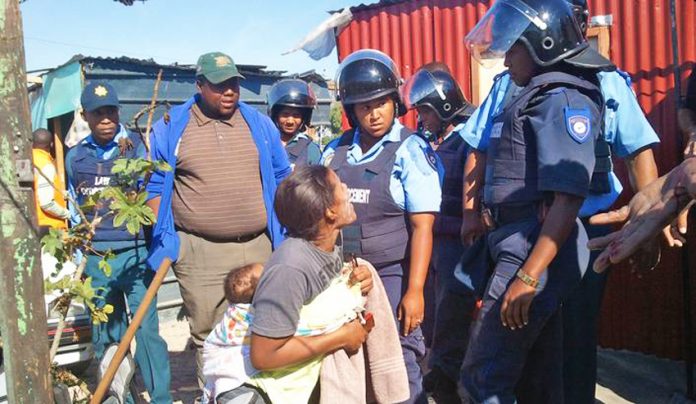SOUTH Africa’s former North West deputy police commissioner William Mpembe is one of nine people who appeared in the Rustenburg Magistrates Court on Thursday in connection with two cases linked to the 2012 Marikana killings.
Mpembe was arrested on Thursday morning on charges brought against him as a result of the recommendations from the commission of inquiry into the massacre. He faces several charges, including four counts of murder and six of attempted murder.
Mpembe was among seven officers and two security guards who appeared in court on charges related to the 2012 violence during the wildcat strike by miners on the platinum belt. The charges related to an incident on August 13, 2012 in which striking miners were stopped by police while making their way from the mines to the koppie.
The officers appeared in court for the death of Thembelakhe Mati, Semi Jokanisi and Phumzile Sokhanyile. Mpembe and three other senior officers were released on a warning after appearing on charges of contravening the Independent Police Investigative Directorate (IPID) Act and defeating the ends of justice, while the major general faces an additional charge for misleading the commission of inquiry led by retired judge Ian Farlam.
Mpembe appeared a second time with four other accused, where he faces four charges of murder and six of attempted murder relating to the killings in the days leading up to the Marikana massacre.
Mpembe has been released on R5,000 bail. On August 16, 2012, police shot dead 34 miners and wounded scores more while trying to put an end to their strike for a better wage. Most of the miners were shot in the back. By the end of the strike, 44 people had died.
Miners demanded that their pay be increased to R12,500 per month, nearly tripling what they earned at the time. Seventy-two police officers involved in the killing of the miners were investigated by the IPID.
Last month, following new President, billionaire and former Lonmin director, Cyril Ramaphosa’s promise of atonement for the Marikana massacre, families of the striking miners who were killed said that reparations should include a formal apology from the police minister and the institution of criminal charges against the police officers involved. During Ramaphosa’s response to the debate over his first State of the Nation Address he said he was determined to play whatever role he could in the process of healing and atonement in relation to the Marikana massacre.
The Socio-Economic Rights Institute of South Africa (SERI), which represents 36 families of the killed miners, welcomed the president’s comments, but urged him to turn his promises into actions.
SERI said in a statement, if the government was serious about atoning for the Marikana massacre, the families of those killed had indicated that a meaningful response would include financial compensation, a formal apology from the police minister and that the police officers involved in the killings be charged criminally and prosecuted.
The Marikana miners’ union the Association for Mining and Construction Union (Amcu) President Joseph Mathunjwa was disappointed that only seven police officers will be charged in connection with the murder of mineworkers during the Marikana strike. He said on Wednesday: ‘Justice must be served because the culprits of these heinous acts have never been arrested or charged. I am disappointed that only seven officers will be appearing in court because there are more.
‘It’s particularly disappointing that these officers’ leaders will not be charged or even brought in for questioning because they did not act unilaterally. ‘They received instructions to do what they did; we are hopeful that the truth will come out as the process unfolds.’
He was speaking ahead of announcing that Amcu’s 20,000 members will march to the Union Buildings in Pretoria on March 20 to protest at the mass job losses in the mining industry and other socio-economic issues. The protest will affect staff attendance at various mines across the country‚ with marches planned in Polokwane‚ Durban‚ Welkom and Pretoria.
Although the strike will be protected‚ workers stand to lose income on the day as the ‘no work‚ no pay’ rule will apply. Amcu applied for the strike certificate at the National Economic Development and Labour Council in 2017. Amcu president Joseph Mathunjwa said that ‘if we don’t do something quickly‚ it looks like more is set to come,’ in reference to job losses in the mining industry‚ which were recorded at 50,000 between 2012 and 2015.
Mathunjwa was briefing reporters in Johannesburg on Wednesday‚ where he added that the union will also be demanding that the Department of Mineral Resources should enforce stricter measures to ensure the implementation of social and labour plans by mines. Amcu will also soon start wage negotiations with employers in the coal industry.
Although Mathunjwa would not disclose the union’s demands ahead of the talks‚ he said the union would take into consideration some of the economic pressures workers are facing‚ such as the VAT increase announced in February.
In a statement on Wednesday, the South African Federation of Trade Unions (SAFTU) pledged its ‘solidarity with the mineworkers at the Evander mine in Mpumalanga, who are the latest victims of the continuing job-loss bloodbath in the South African mining industry. ‘More than 30,000 jobs have been lost nationally since 2014, while net investment has declined 57% over the past decade. Lonmin announced in December 2017 that 12,600 jobs will need to be cut over the next three years, in addition to the 1,100 positions shed by the company in 2017.’
